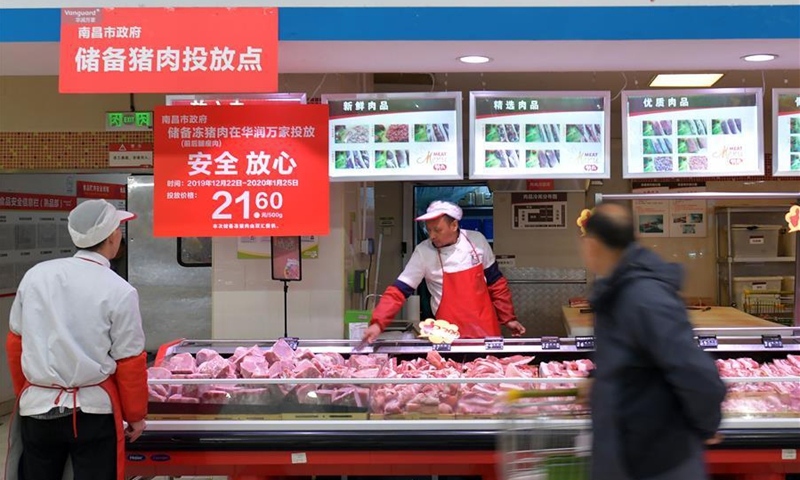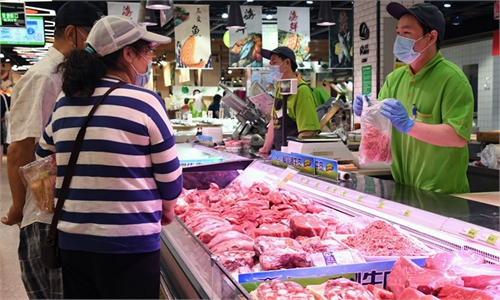SOURCE / INDUSTRIES
China suspends meat imports from more foreign plants due to COVID-19 spread
China customs has issued a revised import suspension list, adding a number of contaminated meat suppliers from Germany, Brazil and the UK, where the COVID-19 pandemic continues.
One Brazilian and two German pork factories were prohibited from exporting to China on Saturday after products from a British beef factory were suspended on Friday, according to China's General Administration of Customs.

The temporary ban will impact the business of the factories as China is the largest meat consumption market, Gao Guan, deputy director of the China Meat Association (CMA), told the Global Times Tuesday. He predicted that there could be more additions to the list.
China's pork consumption accounts for 46 percent of global pork consumption, while beef, lamb and poultry respectively account for 11 percent, 33 percent and 15 percent of global consumption, Wang Bin, deputy director general of the Department of Market Operation and Consumption Promotion, Ministry of Commerce said at an event in November 2019, Yicai.com reported.
China is the biggest market for agricultural products from many countries, including Australia. Following China's beef import suspension in May, Queensland Premier Annastacia Palaszczuk said that up to 3,200 jobs were at risk, ABC reported.
Meanwhile, the suspension of meat imports from some foreign countries could result in rising retail prices in China, Gao said.
According to recent data from the Ministry of Agriculture and Rural Affairs, the average price of pork in China's wholesale market reached 46.05 yuan ($6.56) per kilogram on July 3, up more than 19 percent compared to 38.65 yuan per kilogram on May 29. Other meat products have gone up.
"We hope that countries can do a good job in controlling the epidemic. However, the suspension of meat imports doesn't affect China very much - up to 90 percent of meat consumed in China is produced domestically," Gao said.
China is willing to lift the suspensions, but that depends on the prevention and control work of the factories concerned, analysts said.
"If the contaminated factories regain normal production with effective preventive measures in place, we can restart meat imports," said Gao.
One Brazilian and two German pork factories were prohibited from exporting to China on Saturday after products from a British beef factory were suspended on Friday, according to China's General Administration of Customs.

Staff members prepare pork at a supermarket in Nanchang, East China's Jiangxi Province, December 22, 2019. Local authorities has released on Sunday more frozen pork reserves to ensure market supply for the upcoming holidays and to keep the pork price stable. Photo: Xinhua
The suspensions came after coronavirus infections were detected among meatpacking workers in those plants.The temporary ban will impact the business of the factories as China is the largest meat consumption market, Gao Guan, deputy director of the China Meat Association (CMA), told the Global Times Tuesday. He predicted that there could be more additions to the list.
China's pork consumption accounts for 46 percent of global pork consumption, while beef, lamb and poultry respectively account for 11 percent, 33 percent and 15 percent of global consumption, Wang Bin, deputy director general of the Department of Market Operation and Consumption Promotion, Ministry of Commerce said at an event in November 2019, Yicai.com reported.
China is the biggest market for agricultural products from many countries, including Australia. Following China's beef import suspension in May, Queensland Premier Annastacia Palaszczuk said that up to 3,200 jobs were at risk, ABC reported.
Meanwhile, the suspension of meat imports from some foreign countries could result in rising retail prices in China, Gao said.
According to recent data from the Ministry of Agriculture and Rural Affairs, the average price of pork in China's wholesale market reached 46.05 yuan ($6.56) per kilogram on July 3, up more than 19 percent compared to 38.65 yuan per kilogram on May 29. Other meat products have gone up.
"We hope that countries can do a good job in controlling the epidemic. However, the suspension of meat imports doesn't affect China very much - up to 90 percent of meat consumed in China is produced domestically," Gao said.
China is willing to lift the suspensions, but that depends on the prevention and control work of the factories concerned, analysts said.
"If the contaminated factories regain normal production with effective preventive measures in place, we can restart meat imports," said Gao.



